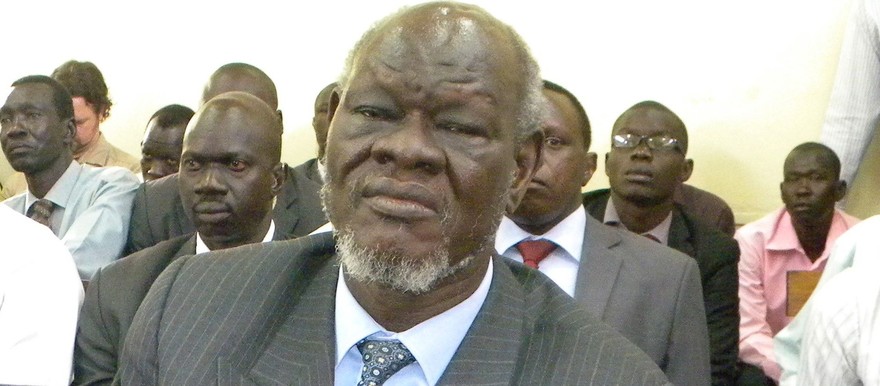Dr. Peter Adwok Nybaba, former Minister of Higher Education, who was initially among the suspected coup plotters detained in Juba last December, turned up to court last week thinking he would be cited among the plotters. He was not.
The first session for the trial brought charges against four men accused of plotting a coup against the government of Salva Kiir Mayardit. Prosecutors also made mention of seven suspects who had been released ‘on bail’ to Kenya, asking the court that they return to South Sudan, but the prosecutors failed to mention Peter Adwok Nyaba.
At the last court session an adjournment was announced until 19 March, in order to give the seven time to return. However, no proceedings resumed today. Instead, the second hearing appears to be delayed at least until tomorrow, amid indications that none of the seven have yet returned to appear before the court.
Nyaba was among those arrested in December, but was released only days later, about a month before the other seven were released. President Salva Kiir later explained in a speech that this was on account of Nyaba’s disability, caused by a wartime injury.
In an interview, the former minister explains his uncertainty about his own situation as well as his views on the treason trial.
Q: Dr Peter Adwok, what does it mean that your name was not among the 11 coup plotters accused by the government of attempting a coup?
Adwok: I don’t know why they did not mention by name. You know, I was supposed to be among them.
Q: But are you not among those who were released on the bail? And how does it mean to you that your name does not appear in the court?
Adwok: Well my name doesn’t appear here, and of course I don’t know which one am I now, whether free or not.
Q: How did you view the first session of the court?
Adwok: For me the way I see it, the case cannot be made on two things alone, one of which is hearsay and the other is something from a press statement. It’s doesn’t indicate that there was some sort of plotting.
Q: There was a request from the lead prosecutor that the court should be in camera (not open to the public), which the court rejected. How do you react on that?
Adwok: Well, this case is attracting a lot of interest both locally and regionally and internationally, so you can’t do it in camera, it should be openly so that the people should know whether the government has the facts about the coup or not. Because up to now they did not give to the world the evidence of the coup. The evidence of a coup can’t come from the press statement of 6th December, 2013.
Q: The public are concerned about the trial, what do you say to them?
Adwok: We still do not know the outcome of the court, and nobody should ‘jump the gun’ at this stage. It is difficult to say anything here. We want to see how the judges react and to test the justice system in South Sudan.
Related coverage:
Prosecution in Amum case ask for secret trial (11 March)
Treason trial opens in South Sudan capital (11 March)
South Sudan releases two politicians, others remain in custody (27 Dec.)




